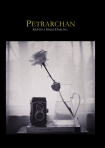 Petrarchan. BlazeVOX Books, 2013. Available here.
Petrarchan. BlazeVOX Books, 2013. Available here.
Praise for Petrarchan:
Here we have camera obscura’s promise of fresh sight, but on new terms. Rather than a singular inversion by way of a pinhole into darkness, Kristina Marie Darling has made a sustained, sequential engagement with shards hooked in the bright margin of possibility as it appears to an utterly opened gaze. The first six sections have an effect not unlike the tender clarity of Cornell’s dream notes, and, like them, evidence a mind opened to the extreme, apophatic, earthly, intelligent, harmed, and longing. It’s a beautiful book.
—Kathleen Peirce, author of The Ardors
Truly felt and expressed, how could a human emotion fail to break the form of a poem? In the fourteenth century, the humanist Francesco Petrarca discovered that the prohibition against mixing formal virtuosity with overpowering sentiment made this combination all the more poignant, and even explosive. He called his collection of poems Rime sparse, “scattered rhymes,” because although the poems were perfect wholes, they depicted people in pieces, brokenhearted.
Petrarch’s recent followers have mainly been songwriters, such as Cole Porter and Smokey Robinson. Darling, a poet, returns to the source, and decides to have her own renaissance. Petrarchan reduces Petrarch’s collected works to their barest supports. A series of footnotes — definitions, explanations, and interpretations — invents new contexts for texts that are present in title only. The two appendices create new poems using a few isolated words and phrases from translations of the Rime. These poems have an intense, aggressive relationship to their sources, activating both the beauty and the pathos of fragmentation.
—Aaron Kunin, author of Folding Ruler Star
Kristina Marie Darling’s Petrarchan is a love story etched around the borders of some disappeared or otherwise concealed text. Or it’s the lyrical counterpart to that which is impossible to capture in words without lapsing into the hyperbolic. These footnotes-as-poems blur into light, counterpointed by the empty space on the pages above, an endless circularity of corridors and rooms, ghostly and multiplying, within the “house by the sea.” These vivid points of recess and flaring luminosities spark the imagination to fire. And the erasures that act as echoes at the end of this sequence, comprised of text taken from Petrarch’s Sonnets, resonate through history with a remarkable immediacy. Petrarchan is masterfully orchestrated and brilliantly composed, and it achieves a gestalt that is the more remarkable for the fact of this book being largely a sequence of fragments and miniature deconstructions.
—David Dodd Lee, author of The Nervous Filaments
Redacted and elliptical, Petrarchan reimagines the grotesque Wuthering Heights haunted house as a rhizomic Regency Romance estate and the result is not unlike the genre of film that Pauline Kael once called the end of Western Civilization as a cocktail party. The book, which may be one poem or many, collects many of the exciting interdisciplinary strands of contemporary poetry: New Narrative, the all-footnote poetry of Jenny Boully, glam decadence, cinephilia and architectural influences, the archival work of writers like Robin Schiff, and the idea that all writing is always already translation. Film editor Walter Murch once described the films he loved as being filled with offscreen space and Petrarchan is such a film: footnotes to an invisible text, rather like Archimedes calculating a structure’s height by measuring its shadow.
—Ken Chen, author of Juvenilia
Kristina Marie Darling’s Petrarchan uses ideas of the fragment, the unsaid, and the unknown to gesture towards her own passionate syntax. It seeks the person in Petrarch’s humanism.
—Sean Singer, author of Discography
Reviews of Petrarchan:
“Petrarchan is a dazzling whirlwind of broken fragments and a historically rich text, blooming with a garden of metaphors. Darling astounds in her ability to take fragments and transform them into stunning lyricism. You read, and you enter her worlds: it’s a sort of hypnosis.”—Ploughshares Magazine.
“As always, Darling’s work is beautiful and inspiring while exposing fragility of human nature and its emotions.”—Poet Hound.
“Darling makes a beautifully told and compelling case that walls can be broken if we ask ourselves to struggle forward, forget the narrative of the page, let go for a moment the idea that all can be known, and finally, to dig around in the margins for what suits us best.”—Heavy Feather Review.
“It is a truly remarkable thing that Darling does here. She has taken the stylistic traits that followers of hers have come to know and love and take them to new heights…It is sure sign of the growing mastery of her skills as a poet. I have read the book several times now and can honestly say that Kristina Marie Darling’s Petrarchan is one highly recommendable and addictive piece of literature. I can only imagine where she will go from here.”—Gently Read Literature.
“Petrarchan is rich in imagination. Kristina Marie Darling’s voice is remarkable and bold and worthy of her title’s humanist inspir…ation. What is best in us as members of the human species comes from our ability to dream, to envision, and to construct meaningful stories; Darling’s work fosters these abilities in her readers.”-Coldfront Magazine.
“Petrarchan is a beautiful creation, imbued with the eeriness of found footage, deeply rewarding whether you are familiar with Petrarch or not. It is a book you want to read over and over, each note deepening the mystery, hours of wondering packed into each sentence. I will dream about this ‘house by the sea’ for a long time to come.”-Sein und Werden.
“In my opinion, her erasures, her abandoned footnotes, and her appendices are perfectly suited for the kind of deconstruction evident in the text. She has shown us, in previous books, how versatile these devices can be as poetic forms, but in engaging one of the urtexts of Western poetics, she really demonstrates how powerful they can be at resituating subject and object, viewer and viewed.”-Word Riot.
“Her project—six sections of poems-in-footnotes, two appendices of erasures and fragments from Petrarch’s work—emphasizes the pastness of the Petrarchan mode, but notes how some remnants of it remain. Known for employing postmodern and genre-bending techniques in her previous books and chapbooks, Darling does the same in this slim collection.”-DIAGRAM.
“One thing that has repeatedly struck me about Kristina is how much larger in stature her writing voice is than its author. To be clear, this is not to reduce her as a person, but to exemplify her work as a force.”-HTML Giant.
“In the early work of Agnes Martin the grids are strictly ruled, blank swathes blind and girded. I feel this way about Darling’s Petrarchan, admirably. The main section-for there are also appendices of erasures, which, rather like ruinous harmonics, function as of melody-composes itself outside content, situated in the somewhat paratextual space of footnotes.”-Yellow Field.
“Darling continues to demand that her reader be an active one; her reader must be willing to engage with and participate in the drama unfolding. We must piece together the fragments ourselves in order to ‘understand this house by the sea, its faultless architecture.'”-The Rumpus.
“The poems, non-existent, allude to themselves through interwoven footnotes, which frame the empty pages so richly, it feels as though the verse were pared down to the most incidental, stirring self-realizations. Through them, Darling explores the land-scape of her psyche – a “house by the sea.” Its archetypal fiber weaves the numerous and obscure corridors of her soul out of domestic imagery. A necklace beneath a stairwell glimmers as the steps catch fire.”-Columbia Poetry Review.
“Footnote poetry is new to me, and what better way to discover its potential – the fragments here are beautiful, bewitching and (probably) infinitely re-readable!”-Sarah James, author of Into the Yell.
“Every generation produces its writers who knead the parameters of expectation; think Stein, Joyce, Ferlinghetti, Cummings, visionaries of conception and style who set new literary standards. In our time, this is Kristina Marie Darling.”-Gold Dust Magazine.
“Darling’s collection is, at heart, a mystery, since the reader must work towards meaning from these scant clues, but it’s also a beautiful elegy about what it is to be human. All that we can ever “see” of another person are, truly, scraps like these, and yet we try to draw meaning and make connections. All we can see of a writer is what we can glimpse through her/his writing. But there are clues that we can connect. There is hope for a connection. And there is beauty, as evidenced by Darling’s elegant, refined language.”-PANK Magazine.
Interviews about Petrarchan:
Excerpts:
